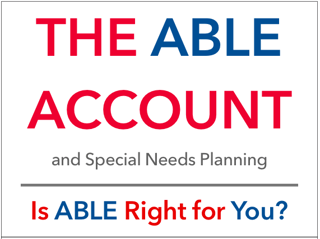Updated June 30, 2021
Representative Payees Managing Income and Social Security Benefits
 The ABLE is a great tool to help keep a balance below $2,000 in a Representative Payee (or an Individual's) checking account.
The ABLE is a great tool to help keep a balance below $2,000 in a Representative Payee (or an Individual's) checking account.
Who/what is a representative payee? A representative payee is a person, usually a family member or friend but may be an organization, appointed by the Social Security Administration to help beneficiaries manage their social security benefits.
The following lists the required duties of a payee.
Required Duties:
- Determine the beneficiary’s needs and use his or her payments to meet those needs;
- Save any money left after meeting the beneficiary’s current needs in an interest bearing account or savings bonds for the beneficiary's future needs;
- Report any changes or events which could affect the beneficiary's eligibility for payments;
- Keep records of all payments received and how you spent and saved them;
- Provide all records of how payments are spent or saved to SSA upon request;
- Report to SSA any changes that would affect your performance or your continuing as payee;
- Complete reports accounting for your use of payments, as required;
- Return to SSA any payments to which the beneficiary is not entitled; and
- Return to SSA any payments saved when you are no longer the representative payee for the beneficiary.
*Source: Social Security Administration
For more information about Representative payees, visit https://www.ssa.gov/payee/?tl=2 .
Case Study
The Situation:
 Our client called and was very distressed that she had lost her son’s SSI income due to having more than $2,000 in his representative payee account.
Our client called and was very distressed that she had lost her son’s SSI income due to having more than $2,000 in his representative payee account.
The Options We Considered:
Before the ABLE was launched, our first go-to would have been to think creatively about items or services her son could both benefit from and pay for. We asked if there was anything he needed that she could spend the extra money on? She had already purchased a new computer for him as well as some new winter clothes. He really did not need much of anything else.
She could put the additional money into his already established and funded first party supplemental needs trust. However, the trust held money he had inherited from his grandparents and she considered the SSI benefits “his money”.
Now, an option to be considered would be the ABLE Account, which would allow for contributions of excess funds above the $2000 threshold in the representative payee account.
The Benefits of Using an ABLE Account:
The ABLE account savings option allows contributions up to $15,000/year into the account, to be used for the beneficiary's short term needs or invested for longer term needs. As long as the account, housed in Massachusetts, remains under $100,000, her son’s benefits will not be impacted.
When reviewing the investment options with her, we reminded her to choose the investments best suited to her son's use of the funds in the account. Funds used to pay expenses in the nearer term should ideally be placed in an investment that will have very low volatility, and may offer a lower return, so she will know the money will be there when needed. To save for the longer term, she may want to select a fund that has had greater volatility but also greater returns.
Content in this material is for general information only and not intended to provide specific advice or recommendations for any individual, nor intended to be a substitute for specific individualized tax or legal advice. We suggest that you discuss your specific situation with a qualified tax or legal advisor. There is no assurance that the techniques and strategies discussed are suitable for all individuals or will yield positive outcomes.
The experiences described here may not be representative of any future experience of our clients, nor considered a recommendation of the advisor's services or abilities or indicate a favorable client experience. Individual results will vary.
Investing involves risk including loss of principal. Prior to investing in an ABLE account, investors should consider whether the investor’s or designated beneficiary’s home state offers any state tax or other benefits available for investments in such state’s ABLE program.




